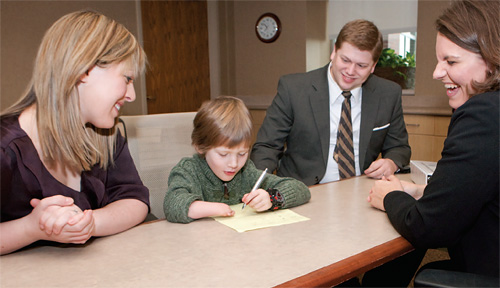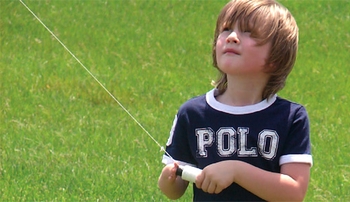Kourtney Case knew she’d find out the sex of her baby at her 20-week ultrasound. She didn’t know she’d learn her baby boy would be born without a hand.

|
| Braedyn Case, 4, with parents, Kourtney and Mark, shows prenatal genetic counselor Sara Fisher, how he writes his name. Fisher counseled the family after Braedyn was diagnosed with Amniotic Band Syndrome in utero. |
With the news came a barrage of questions.
How did this happen to my baby? Why me? What did I do wrong? Does it hurt him? Will my son have trouble making friends? Playing sports? Will he go to prom? Get married? Are there other underlying problems with this pregnancy? Is
he going to be born healthy? Will I have to roll up his sleeves?
Thankfully, Sara Fisher, a prenatal genetic counselor at UNMC’s Munroe-Meyer Institute, was there with the answers.
As for how it happened, the official cause was amniotic band syndrome (ABS) in which the lining of the amniotic sac comes off in a string and acts like a rope, wrapping around the extremity and cutting off blood flow to the limb.
Why her? There was no genetic reason for it.
What did she do wrong: Absolutely nothing.
Does it hurt him? No.
Will he have trouble making friends, playing sports, go to prom, get married? Five years later, Braedyn Wade Case is answering some of those questions himself. He writes his name, golfs with his dad and does typical five-year-old boy things like play Thomas the Train with his buddies.
Many of Fisher’s patients are referred from abnormal ultrasounds like Case’s or abnormal first or second trimester screens. Her job is to help moms and dads make informed decisions about genetic testing options.
“We provide information and test, not to change anything, but to prepare parents for a baby with whatever the condition is,” she said. “That way, they can be happy about the birth of their baby, rather than worry about a diagnosis in the delivery room.”

|
| Braedyn Case flies a kite at an event for Nebraska Children with Upper Limb Deficiencies (NCULD), an organization started by his mother, Kourtney. |
Counseling helped Case decide to do an echo-cardiogram as upper limb deficiencies can be associated with heart problems. Such was not the case with Braedyn. She opted not to do an amniocentesis after the ultrasound revealed that ABS was most-likely an isolated incident.
“The great thing about testing and screening is the peace of mind,” Case said. “If you know something ahead of time, you can come to terms with it, rather than having to go through that grief process when your child is born.”
Case writes on her website: “I was excited and even impatient to bring our first child into the world. I started thinking about the color of his hair and eyes and thinking less about what his hand was going to look like.”
On Sept. 12, 2006 at 1:16 p.m., Braedyn was born. The development of his right arm stopped just below the wrist, but he had little finger buds with fingernails. Knowing this would be the case ahead of time, the first-time mom was able to fully appreciate the birth of her son.
The positive experience kept Case coming back for prenatal genetic counseling for her next two pregnancies. Because Fisher has more time with families than a
physician might, she can sit down and explain testing procedures and potential results in non-medical terms using illustrations and analogies.
It helps that the lab that does the testing is right around the corner. The Human Genetics Lab at MMI receives samples from all over the world.
“Being just down the hall from the lab that does the testing is crucial,” Fisher said. “I have that direct contact since I know the name of the person to ask a question.”
Though not part of her official job description, Fisher also connects families with support groups and other families in similar situations. One of the families Fisher referred Case to is now a member of the Nebraska Children with Upper Limb Deficiencies (NCULD) support group. The Case family founded the
organization. The group features educational guest speakers and group outings for children with hand anomalies.
Case would, and has, recommended prenatal genetic counseling to others.
“It helps you cope with the situation,” she said. “That way you can get all
your questions answered.”
Like “Will I have to roll up his sleeves?”
The answer is no. Braedyn dresses himself and is on the cusp of tying his own shoes.